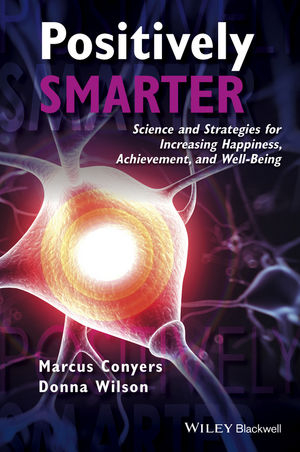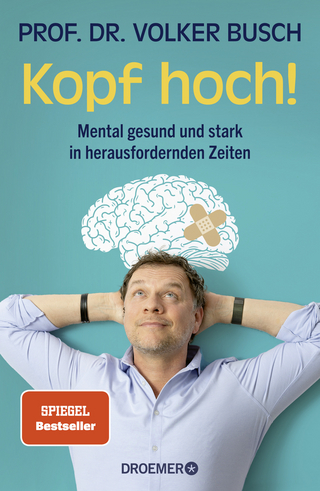
Positively Smarter
Wiley-Blackwell (Verlag)
978-1-118-92609-3 (ISBN)
Brings together current research on cognitive psychology, education (learning), and implications of neuroscience to suggest powerful ways to enhance the kind of cognitive function and productivity that leads to happiness and success
Applies implications of current research showing that happiness is a skill and that positive affect can lead to higher levels of creative problem solving, productivity, achievement, and well-being
Shares research and strategies for supporting physical activity and nutrition that may enhance neuroplasticity, cognitive performance, and positive affect
Puts learners first and then brings in the science, presenting creative or adaptive strategies that can be applied in the real world
Includes action assessments to guide readers in taking concrete steps to achieve the goals they set for themselves
Identifies deeply held assumptions that innate talent, genes, socioeconomic status, and ethnicity mean that a significant percentage of the population lacks the neurocognitive potential to achieve at higher levels
Draws on the authors’ research from a broad range of fields in order to maximize the positive impact of a synergistic approach
Marcus Conyers and Donna Wilson are codevelopers of curriculum for the master’s and educational specialist degrees with majors in brain-based teaching and a doctoral minor in brain-based leadership with Nova Southeastern University. They are authors of numerous books including, Five Big Ideas for Effective Teaching: Connecting Mind, Brain, and Education Research to Classroom Practice (2013). Marcus Conyers is founder of the Center for Innovative Education and Prevention and an international speaker on increasing higher-order thinking skills, achievement, and well-being. Donna Wilson, PhD, is an educational psychologist and teacher educator who completed postdoctoral studies in structural cognitive modifiability. Former chair of education of the University of Detroit Mercy, she is an adjunct professor at NSU.
Acknowledgments xiii Introduction 1
Appreciating Brain Plasticity: The Key to Redefining Potential 4
The Path to Positively Smarter 4
Our Personal Introductions to the Science That Supports Ways for Becoming Positively Smarter 8
1 Building a Smarter Brain 11
Neuroplasticity in Action 12
Your Brain at Work: A Continual Construction Zone 14
Beyond Conventional Wisdom: Harnessing Your Neurocognitive Synergy 21
Intelligence Takes Many Forms 21
People of All Ages Have the Capacity to Improve Their Knowledge and Abilities 23
What We Do Has a Greater Influence on How We Age Than Genetics 24
How We Think Can Influence Our Health 24
We Can Build Muscle and Become Stronger Well into Our Eighties 25
It’s Hard to Identify the Children Who Are “Destined for Greatness” 25
Perceptions about Malleable vs. Fixed Intelligence Matter—a Lot 26
Plasticity as a Path to Becoming Positively Smarter 29
A New Positive Paradigm 35
The Innate Talent (IT) Paradigm 35
The Untapped Potential (UP) Paradigm 36
2 Why Happiness Matters 41
Reaping the Many Benefits of Happiness 42
I’ll Be Happy When . . . 45
What Is This Thing Called Happiness? 47
Spirituality and Religion as Sources of Happiness 51
Tapping into the Science of Happiness 51
Achieving Greater Happiness Through Practical Metacognition 54
Applying the CIA Model 55
CIA in Action: Happiness and Subjective Well-Being 57
3 Stop Daydreaming and Start Thinking Your Way to Higher Levels of Happiness 60
Connecting Thinking and Feeling 63
The Focused Fifteen 67
1. Savor the Wow of Now 67
2. Work at Maintaining an Upbeat Attitude with Positive Self-Talk 69
3. Picture a Positive Future 73
4. Kindness the Killer App 74
5. Active Appreciation: Create and Tune into Your Appreciation Station 76
6. Give It a Break: Hang Your Problems Away for a While 77
7. Treat Your Relationships Like a Treasure (Because They Are) 78
8. Pursue Flow 80
9. Pursue Smarter Goals 80
10. Enhance Your Resilience: Build Your Own Palmetto Fort 82
11. Untie the Knots That Bind: Free Yourself with Forgiveness 83
12. Move Your Body, Boost Your Mood 84
13. Smile, and Your Brain Smiles with You 85
14. Play to Your Peak Strengths 85
15. Practice the Art of Treasuring 86
How to Be Less HappyMore of the Time 87
Maintain Your Positive Focus by Playing Your ACE 88
4 Working Toward Achieving Your Goals 92
Realizing Our Potential 93
“Natural” Talent vs. Deliberate Practice 95
Motivation to Take Positive Risks 98
Finding “Flow” 101
Putting Your Will to Work 102
Getting Gritty as a Path to Achievement 106
Build Your “Memory Muscle” to Make the Most of Your Work 108
A Personal Perspective on the Payoff for Hard Work 111
5 Working Smarter with Practical Metacognition 117
The Input–Processing–Output Model of Learning 121
Cognitive Assets You Can Develop to Work Smarter 123
Clear Intent 124
Appropriate Courage 125
Systematic Search and Planning 126
Understanding and Managing Time 127
Cognitive Flexibility 128
Learning from Experience 129
Finishing Power 129
Pacing on the Path to Positively Smarter 131
Practical Metacognition in Action: Lessons from the Grameen Bank 133
6 Better Together 136
Born to Be Social: Impact on Health and Well-Being 139
Anatomy of the Social Brain 141
Getting “Socially Smarter” 143
Accentuate the Positive 144
Polish Your Listening Skills 146
Consider Others’ Points of View 147
Establish Rapport 148
Learn Together 149
Become a Great Encourager 150
Contribute to the “Social Capital” of Your Community 152
Being Social in a High-Tech World 153
7 Building a Smarter Body–Brain System Through Exercise 159
Work Out the Body to Keep the Brain Young 161
New Muscle Is Young Muscle 163
The Body–Brain System Inside and Outside the Classroom 166
Reward Your Body with Adequate Rest 168
Find What You Love 169
Making Exercise Part of Your Routine 170
Putting the Research on Exercise into Personal Practice 171
Low Heart Rate Route to Runners’ High 173
Winning Our Blades: A Positive Payoff 173
8 Fuel Your Body–Brain System for Peak Performance 177
The Brain Benefits of “Going Mediterranean” 179
What’s on Your Plate? 181
Why and How to Eat Smarter 182
Better by the Dozen: Twelve Power Foods to Fuel Well-Being 188
Educational Implications of Becoming “HealthWise” 191
9 Bringing It All Together, Putting It into Practice 197
Forging a New Foundation Grounded in Neuroplasticity 199
Examples of the UP Paradigm in Practice 201
Seven Principles of the Positively Smarter Approach 202
Principle 1: Keep Neuroplasticity Front of Mind 203
Principle 2: Build the Skills of Optimism and Happiness 203
Principle 3: Appreciate Your Potential to Become Smarter 203
Principle 4: Apply Practical Metacognition and Cognitive Assets 204
Principle 5: Use Your Social Brain to Enhance Well-Being and Achievement 204
Principle 6: Get Moving to Grow Your Brain (and Become Fitter, Stronger, Smarter, and Happier) 205
Principle 7: Fuel Your Body–Brain System to Enhance Productivity and Learning 205
Capitalize on Your Neurocognitive Synergy 206
The Practical Metacognition Process for Pursuing Important Goals 206
Thanks for Joining Us on a Journey to Becoming Positively Smarter 209
Appendix 212
Index 219
About the Authors 229
| Erscheint lt. Verlag | 10.7.2015 |
|---|---|
| Verlagsort | Hoboken |
| Sprache | englisch |
| Maße | 160 x 236 mm |
| Gewicht | 454 g |
| Themenwelt | Sachbuch/Ratgeber ► Gesundheit / Leben / Psychologie ► Psychologie |
| Geisteswissenschaften ► Psychologie ► Allgemeine Psychologie | |
| Geisteswissenschaften ► Psychologie ► Biopsychologie / Neurowissenschaften | |
| Geisteswissenschaften ► Psychologie ► Pädagogische Psychologie | |
| Sozialwissenschaften ► Pädagogik ► Allgemeines / Lexika | |
| ISBN-10 | 1-118-92609-9 / 1118926099 |
| ISBN-13 | 978-1-118-92609-3 / 9781118926093 |
| Zustand | Neuware |
| Haben Sie eine Frage zum Produkt? |
aus dem Bereich


